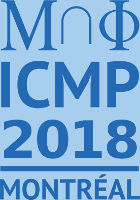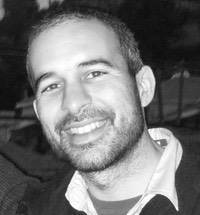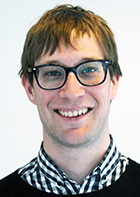YRS Plenary Talks
- Christian Hainzl (Universität Tübingen)
- Vojkan Jaksic (McGill University)
- Robert Seiringer (IST Austria)
- Friday, Jul 20 [maass bldg. room 112]
- 09:00 Mihalis Dafermos (Princeton University), On falling into black holes
- Saturday, Jul 21 [maass bldg. room 112]
- 09:00 Matthias Christandl (University of Copenhagen), Tensors: From Entanglement to Computational Complexity
Mihalis is a Greek mathematician. He is a Lowndean Professor of Astronomy and Geometry at the University of Cambridge.
He studied mathematics at Harvard University and was awarded a BA in 1997. His PhD thesis titled Stability and Instability of the Cauchy Horizon for the Spherically Symmetric Einstein-Maxwell-Scalar Field Equations was written under the supervision of Demetrios Christodoulou at Princeton University.
He has won the Adams Prize writing on the subject Differential Equations in 2004 and the Whitehead Prize in 2009 for "his work on the rigorous analysis of hyperbolic partial differential equations in general relativity." In 2015 he was elected as a fellow of the American Mathematical Society.
On falling into black holesThe celebrated "black hole" spacetimes of Schwarzschild and Kerr play a central role in our current understanding of Einstein's general theory of relativity. Are these spacetimes stable, however, as solutions to the Einstein vacuum equations, in their exterior region? And what fate awaits physical observers who enter inside a "generic" black hole? It turns out that these two questions are intimately related and the answer to the second may be more disturbing than previously thought. This talk will try to explain how so.Matthias Christandl is a Professor at the Department of Mathematical Sciences at the University of Copenhagen.
Matthias' research is in the area of Quantum Information Theory. It is his aim to improve our understanding of the ultimate limits of computation and communication given by quantum theory. Concrete research results include a proposal for a perfect quantum wire and a new method for the detection of entanglement.
Matthias Christandl received his PhD from the University of Cambridge in 2006. He then became a Thomas Nevile Research Fellow at Magdalene College Cambridge. In 2008, he joined the faculty of the University of Munich as a Juniorprofessor; since 2010 he has been assistant professor at ETH Zurich. He moved to the University of Copenhagen in April 2014.
Tensors: From Entanglement to Computational ComplexityThe quantum state of a system of $k$ particles can be viewed as a tensor of order $k$. Local stochastic operations on a quantum state correspond to the application of linear maps to the indices of the corresponding tensor and are studied in entanglement theory and implemented in current quantum information science experiments.Interestingly, the notion of tensor transformation is at the heart of the study of the computational complexity of algebraic problems such as the multiplication of matrices. Strassen's breakthrough algorithm for the multiplication of $d$-by-$d$ matrices that runs faster than your standard $d^3$ high-school algorithm, spurred a whole development of tensor theory.
I will review these connections and present a new family of quantum information-inspired functionals that can serve as obstructions for asymptotic tensor transformations. The functionals are the first of their kind, thereby solving a problem of Strassen from 1986.





